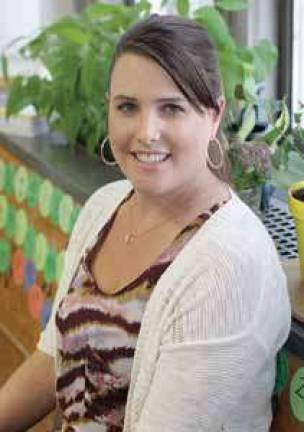Blackboard Awards: Rose Coffield, Pre-K Teacher Uses Video to Teach Kids About Play

By Jackie Kostek Every day, Rose Coffield's pre-kindergarten students are the stars of their own show. "I see myself in more of a supporting role," said Coffield, 34, who teaches pre-kindergarten at The Weekday School at Riverside Church. Of course, Coffield's self-described supportive role doesn't mean she isn't in charge of leading and educating her 4- and 5-year-old students. She's just developed her own approach. "Our curriculum comes from what the children are interested in," said Coffield. "Whatever they want to do, I help come up with a plan, an idea of how to execute it and help collect the materials they need to use." Coffield said the progressive, play-based approach she uses with her students allows for a great amount of choice during the day. Although her students follow a regular daily schedule, much of the day is spent in "choice time," where students choose activities they want to participate in independently or with other classmates. "The children become the masters of their education," said Coffield. "Because of this, they feel very connected to what they are doing." Coffield, too, feels a great connection to her work as a teacher. Seven years ago, this wasn't the case, so at 27, she made two major moves; she leapt from the West Coast to the East Coast and enrolled as a graduate student at New York University's Steinhardt School of Culture, Education and Human Development. As a student teacher and substitute teacher, Coffield got her first taste of progressive education at The Little Red School House. In the five years since she started at The Weekday School, she's honed her own approach to teaching by reflecting on the happenings in her classroom and experimenting with ways to solve problems. "Videotaping was an interesting evolution," said Coffield. Last year, Coffield had a "very physically active" class of nine boys and five girls. On the playground, the group engaged in rough-and-tumble play that Coffield said she struggled with "policing." What was natural and fun for the children Coffield found overwhelming. Coffield consulted with the school's on-staff psychotherapist, who helped her understand the way children play. Armed with information, Coffield decided to begin a conversation with her students that they could more easily understand. "I started to videotape them so we could have more concrete discussions with visual examples of the [physical] play and what I thought needed more structure and rules," said Coffield. "The children really took to the video and were having some great conversations about their feelings," said Coffield. This year, Coffield has expanded the use of video to other parts of the curriculum. And with the school psychotherapist, she's even touted her work with video to other teachers at workshops and conferences. Without knowing it, Coffield may be moving from a supporting role in her classroom to a starring role in education.